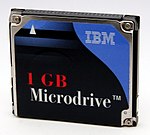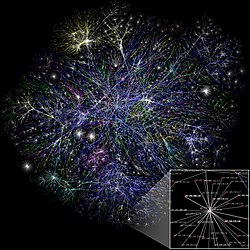What is data?
Data
[edit | edit source]Data is any sort of information. data can be given to a computer and asked to do something with it. the result of what it does is also data.
Memory
[edit | edit source]Data can be stored in memory if the computer is asked to do so. When you burn a CD, you ask the computer to store data on an optical disc.
I/O
[edit | edit source]I/O lets a computer get information from somewhere and lets it send it somewhere also. It's this premise on which networking is based; one computer can send data to another computer.
Names for different sizes of data
[edit | edit source]When choosing a new computer we come across terms such as "300GB hard drive" and "500MB download", and to the uninitiated, this can be somewhat disconcerting. Data in a computer is represented in a series of bits. Since the birth of computers, bits have been the language that control the processes that take place inside that mysterious black box called your computer. In this article, we look at the very language that your computer uses to do its work.
Bit
[edit | edit source]A bit is a binary unit, simply a 1 or a 0. A true or a false. It is the most basic unit of data in a computer. It's like the dots and dashes in Morse code for a computer. Bits are machine readable.
Nibble: A nibble is 4 bits, or half of a byte.
Byte
[edit | edit source]In computer science a byte is a unit of measurement of information storage, that equals '8 bits', can be used to represent letters and numbers. For example, the number 01000001 is 8 bits long, and represents the letter A in ASCII.
Word
[edit | edit source]Unfortunately the term "word" has two definitions. The first is the number of bits that the central processing unit (CPU) of a particular computer can handle at one time is the word size for that computer. These word sizes ranged from a nibble to more than 128 bits. The second definition was pretty much driven by all of the people that were writing software to be used to program computers and this definition fixed the word size at 16 bits (or 2 bytes).
KB
[edit | edit source]A Kilobyte, or KB, is a unit of data that equals 1024 bytes. Actually a kilo means 1000 or 103, so a kilobyte is really a misnomer and 1024 bytes should be a kilobyte. However at the time the term was coined for programming use mainly, and powers of 2 do not fit into 1000 neatly. The use of the abbreviation KB has further masked this anomaly, so today many people still refer to a kilobyte as 1024 bytes.
MB
[edit | edit source]Megabyte is 1024kB; the kilobyte squared, 10242 bytes.
GB
[edit | edit source]
A gigabyte is a unit of data storage worth a billion bytes meaning either exactly 1 billion bytes (10243) or approximately 1.07 billion bytes. More often than not in advertising, Gigabytes are presented as 1 billion bytes and not 10243 (read the fine print in your adverts!). This explains why a freshly formatted 500GB hard drive shows up at a 450GB one instead. Not too long ago many people were discussing storage in Megabytes. These days, storage has become so cheap that having Gigabytes is considered the norm.
TB
[edit | edit source]A terabyte is 10244 and is defined as about one trillion bytes, or 1024 gigabytes. Data centres such as those operated by Google handle thousands if not millions of terabytes of data each day. As storage becomes cheaper and faster, terabytes are becoming a commonly heard term.
PB
[edit | edit source]
A petabyte is a unit of information or computer storage equal to one quadrillion bytes (10245). Microsoft stores on 900 servers a total of approximately 14 petabytes.
A petabyte is an extremely large amount of data.
Measurements of Data Speed
[edit | edit source]Today there are generally 2 ways of describing data transfer speeds: in bits per second, or in bytes per second. As explained above, a byte is made of 8 bits. Network engineers still describe network speeds in bits per second, while your internet browser would usually measure a file download rate in bytes per second. A lowercase "b" usually means a bit, while an uppercase "B" represents a byte.

bps
[edit | edit source]Known as bits per second, bps was the main way of describing data transfer speeds several decades ago. Bps was also known as the baud rate, therefore, a 600 baud modem was one which could transfer data at around 600bps.
Kbps
[edit | edit source]kilobits per second, or 1000 bits per second.
Mbps
[edit | edit source]1,000,000 bits per second (usually used in describing internet download/upload speeds).
Gbps
[edit | edit source]1,000,000 kilobits per second or 1,000,000,000 bits per second. This term is most commonly heard in local area networks, where the close proximity of machines allows for lightning fast data transfer rates.
